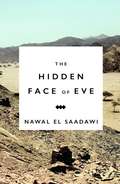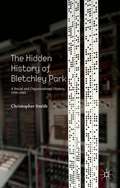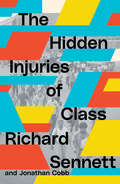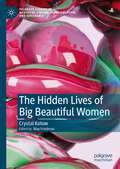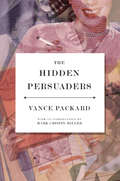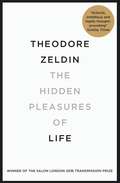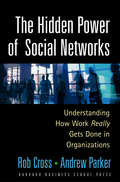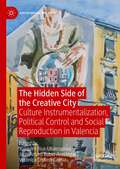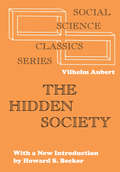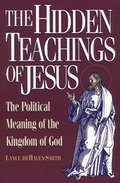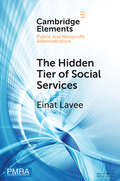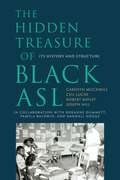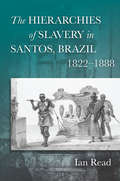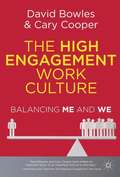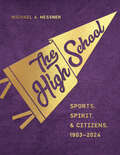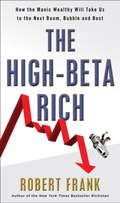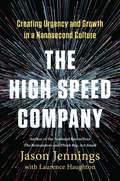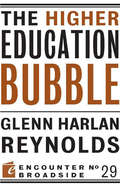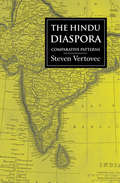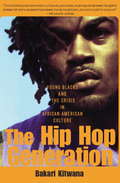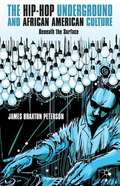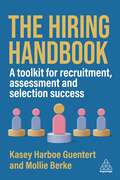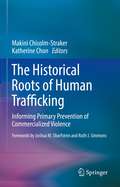- Table View
- List View
The Hidden Face of Eve
by Nawal El Saadawi Sherif Hetata Ronak HusniA classic of modern Arab writing, The Hidden Face of Eve receives fresh life with this beautiful new edition. Nawal El Saadawi’s shocking account of female oppression in the Muslim world is as powerful today as it was when it was first published. El Saadawi’s experiences working as a doctor in Egyptian villages, witnessing forced prostitution, honor killings, sexual abuse, and female circumcision, drove her to pen this book. The Hidden Face of Eve explores the circumstances that led to this violently unjust situation by examining historical roles of Arab women in religion and literature, ultimately arguing that injustices—such as polygamy, the veil, and legal inequality—are incompatible with the essence of Islam and inherent human rights.
The Hidden History of Bletchley Park: A Social And Organisational History, 1939-1945
by Christopher SmithThis book is a 'hidden' history of Bletchley Park during the Second World War, which explores the agency from a social and gendered perspective. It examines themes such as: the experience of wartime staff members; the town in which the agency was situated; and the cultural influences on the wartime evolution of the agency.
The Hidden Injuries of Class
by Richard Sennett Jonathan CobbHow to find dignity and a meaningful life in the modern cityIn this reissue of the 1972 classic of social anatomy, Richard Sennets adds a new introduction to shows how the injuries of class persist into the 21st century. In this intrepid, groundbreaking book, Richard Sennett and Jonathan Cobb uncover and define a new form of class conflict in America an internal conflict in the heart and mind of the blue-collar worker who measures his own value against those lives and occupations to which our society gives a special premium. The authors conclude that in the games of hierarchical respect, no class can emerge the victor; and that true egalitarianism can be achieved only by rediscovering diverse concepts of human dignity. Examining personal feelings in terms of a totality of human relations, and looking beyond the struggle for economic survival, The Hidden Injuries of Class takes an important step forward in the sociological critique of everyday life.
The Hidden Lives of Big Beautiful Women (Palgrave Studies in Mediating Kinship, Representation, and Difference)
by Crystal KotowThis book is a deep dive into the largely unexplored space of BBW “bashes”—multi-day gatherings of fat women and their admirers. Using a range of feminist theories of embodiment and affect, the project is guided by autoethnography and in-depth interviews with twelve participants. Participant experiences are first analyzed with a key focus on experiences that cause grief and disenfranchisement; subsequently, the book looks at experiences that may be radical or revelatory. The book does not seek to either villainize or valorize BBW spaces but instead sheds a bright light on the experience of this cultural subspace and all it may offer to analyses of fat life.
The Hidden Persuaders
by Mark Crispin Miller Vance Packard"One of the best books around for demystifying the deliberately mysterious arts of advertising."--Salon"Fascinating, entertaining and thought-stimulating."--The New York Times Book Review"A brisk, authoritative and frightening report on how manufacturers, fundraisers and politicians are attempting to turn the American mind into a kind of catatonic dough that will buy, give or vote at their command--The New YorkerOriginally published in 1957 and now back in print to celebrate its fiftieth anniversary, The Hidden Persuaders is Vance Packard's pioneering and prescient work revealing how advertisers use psychological methods to tap into our unconscious desires in order to "persuade" us to buy the products they are selling.A classic examination of how our thoughts and feelings are manipulated by business, media and politicians, The Hidden Persuaders was the first book to expose the hidden world of "motivation research," the psychological technique that advertisers use to probe our minds in order to control our actions as consumers. Through analysis of products, political campaigns and television programs of the 1950s, Packard shows how the insidious manipulation practices that have come to dominate today's corporate-driven world began. Featuring an introduction by Mark Crispin Miller, The Hidden Persuaders has sold over one million copies, and forever changed the way we look at the world of advertising.Vance Packard (1914-1996) was an American journalist, social critic, and best-selling author. Among his other books were The Status Seekers, which described American social stratification and behavior, The Waste Makers, which criticizes planned obsolescence, and The Naked Society, about the threats to privacy posed by new technologies.
The Hidden Pleasures of Life: A New Way of Remembering the Past and Imagining the Future
by Theodore ZeldinThe story of a search for a new art of living. How can one escape from work colleagues who are bores and from organisations that thrive on stress? What new priorities can people give to their private lives? When the romantic ideal is disappointing, how else can affections be cultivated? If only a few can become rich, what substitute is there for dropping out? If religions and nations disagree, what other outcomes are possible beyond strife or doubt? Where there is too little freedom, what is the alternative to rebellion? When so much is unpredictable, what can replace ambition? Questions include: What is the great adventure of our time? What is a wasted life? How can people lose their illusions about themselves? What alternatives are there to being a rebel? What can the poor tell the rich? What could the rich tell the poor? How many ways of committing suicide are there? How can an unbeliever understand a believer? How can a religion change? How can prejudices be overcome? How can one think about the future, without trying to predict it or worrying about it? Is ridicule the most effective form of non-violent protest? How does one acquire a sense of humour? What stops people feeling completely at home in their own country? How many nations can one love at the same time? Why do so many people feel unappreciated, unloved and not fully alive? How else might women and men treat one another? What can replace the shortage of soul-mates? Is another kind of sexual revolution achievable? What can artists aim for beyond self-expression? What is more interesting than becoming a leader? What is the point of working so hard? Are there more amusing ways of earning a living? What else can one do in a hotel? What more can the young ask of their elders? Is remaining young at heart enough to avoid becoming old? What is worth knowing? What does it mean to be alive? Where can one find nourishment for the mind?
The Hidden Power of Social Networks: Understanding How Work Really Gets Done in Organizations
by Andrew Parker Rob CrossA powerful, visual framework helps managers discover how employees really communicate and collaborate to get work done - and helps them identify ways they can influence these social networks to improve performance and innovation. InThe Hidden Power of Social Networks, Cross and Parker, experts in "social network analysis"--a technique that visually maps relationships between people in large, distributed groups - apply this powerful tool to management for the first time. Based on their in-depth study of sixty informal employee networks in well-known companies around the world, Cross and Parker show managers how to conduct a social network analysis of their organization.
The Hidden Side of the Creative City: Culture Instrumentalization, Political Control and Social Reproduction in Valencia (Sociology of the Arts)
by Joaquim Rius-Ulldemolins Juan Arturo Rubio-Arostegui Verònica Gisbert-GraciaThis book analyses issues related to the political use and economical misappropriation of urban cultural events, cultural infrastructures, public resources, and cultural traditions in the city of Valencia, Spain. It deals critically with a variety of sociological questions related to cultural production in the city, including geographical segregation as culturally defined in the city; misogyny and the peripheral role of women in traditional cultural events, xenophobia; and nationalism/regionalism.As such, the book will be useful to students and scholars of sociology of the arts, cultural policy, and museum management, and urban sociology.
The Hidden Society (Social Science Classics Ser.)
by J. E. MeadeSocieties consider certain institutions and activities as central, proper, and visible, while others are defined as peripheral, deviant, and private. Vilhelm Aubert takes us to the ""hidden"" societies: the privacy of love, the secrecy of the underground, the remoteness of a ship, the isolation of the ill, the retirement from social life into sleep, and similar fascinating topics.Vilhelm Aubert, a professor of sociology in the Law Faculty of Oslo University and a member of the board of directors of Oslo's famed Institute of Social Research, presents a theory of the hidden societies, a theory concerned with concepts such as time and space, causality, will, and' chance. Chapters on predictability and chance deal with lack of 6rder, with phenomena that appear meaningless or absurd from a point of view very prevalent in modern life. We are presented with a study of isolation as a sociological phenomenon - accepted or fostered by social action - and we see how the existence of lonely, private niches in a society serves, consciously or unconsciously, to satisfy-idiosyncratic needs of individual personalities.
The Hidden Teachings of Jesus: The Political Meaning of the Kingdom of God
by Lance deHaven-SmithThe author of Conspiracy Theory in America presents a radical new view of the person of Jesus and the message of social reform underlying his teachings. Based on the premise that Jesus could not speak his thoughts openly without running afoul of the authorities, political philosopher Lance deHaven-Smith demonstrates how Jesus sought to dismantle worldly systems of command and status and replace them with a society governed by a spirit of holiness. The Hidden Teachings of Jesus also explores how Jesus&’ prophecies are being fulfilled in the modern era. Huge systems of power, privilege, and acquisition have arisen, but so too has a global public opinion which bristles at oppression and demands love and respect for every living thing. In this work, Lance deHaven-Smith points to a spirit of holiness emerging worldwide to dismantle power and status in abusive families, autocratic corporations, tyrannical governments, and many other areas of life. This spirit, he suggests, can bring about the real kingdom of God, the divine order Jesus urged his followers to establish here on earth.
The Hidden Tier of Social Services: Frontline Workers' Provision of Informal Resources in the Public, Nonprofit, and Private Sectors (Elements in Public and Nonprofit Administration)
by Einat LaveeWhat do frontline social service providers do during client interactions when they lack adequate formal organizational resources to respond to clients' needs? To answer this question, this Element presents two large-scale qualitative studies of Israeli frontline providers of social services. Drawing on interviews of public-sector workers (Study 1, N=214), it introduces a widespread phenomenon, where the vast majority of frontline workers regularly provide a large range of informal personal resources (IFRs) to clients. Study 2 (N=84) then compares IFR provision between workers from the public, nonprofit and private sectors. The comparative analysis demonstrates how workers' rationale for providing personal resources to clients is shaped by particular role perceptions embedded in values, norms and behavioral expectations that vary by employment sector. The Element concludes by presenting ramifications of the phenomenon of IFR provision in terms of citizens' wellbeing, social inequality, gender relations and the future of work in public administration.
The Hidden Treasure of Black ASL: Its History and Structure
by Ceil Lucas Robert Bayley Joseph Christopher Hill Carolyn McCaskillBlack ASL has long been recognized as a distinct variety of American Sign Language based on abundant anecdotal evidence. The Hidden Treasure of Black ASL, originally published in 2011, presents the first sociohistorical and linguistic study of this language variety. Based on the findings of the Black ASL Project, which undertook this unprecedented research, Hidden Treasure documents the stories and language of the African American Deaf community. With links to online supplemental video content that includes interviews with Black ASL users (formerly on DVD), this volume is a groundbreaking scholarly contribution and a powerful affirmation for Black Deaf people. This paperback edition includes an updated foreword by Glenn B. Anderson, a new preface that reflects on the impact of this research, and an expanded list of references and resources on Black ASL. The supplemental video content is available online at the Gallaudet University Press YouTube Channel. Under Playlists, click “The Hidden Treasure of Black ASL: Companion Video to the Book.” As featured in the film Signing Black in America: The Story of Black ASL, produced by The Language and Life Project at North Carolina State University (Dr. Walt Wolfram, Executive Producer). Look for it on PBS.
The Hierarchies of Slavery in Santos, Brazil, 1822-1888
by Ian ReadDespite the inherent brutality of slavery, some slaves could find small but important opportunities to act decisively. The Hierarchies of Slavery in Santos, Brazil, 1822-1888explores such moments of opportunity and resistance in Santos, a Southeastern township in Imperial Brazil. It argues that slavery in Brazil was hierarchical: slaves' fleeting chances to form families, work jobs that would not kill or maim, avoid debilitating diseases, or find a (legal or illegal) pathway out of slavery were highly influenced by their demographic background and their owners' social position. By tracing the lives of slaves and owners through multiple records, the author is able to show that the cruelties that slaves faced were not equally shared. One important implication is that internal stratification likely helped perpetuate slavery because there was the belief, however illusionary, that escaping captivity was not necessary for social mobility.
The High Engagement Work Culture
by Cary Cooper David BowlesThe 2008 crisis set off a systemic panic which almost engulfed the world's financial system. Through a lens of sustainability this book examines how organisations can explore a new business culture today. Drawing from real-life examples and new ideas Bowles and Cooper discuss how organisations can move from 'me' to 'we'.
The High School: Sports, Spirit, and Citizens, 1903-2024 (Critical Issues in Sport and Society)
by Michael A. MessnerHigh school yearbooks provide both a vivid snapshot of student life and a reflection of what the adults in the community valued the most. For instance, athletics are often covered more than academics, and boys’ sports routinely receive more attention than girls’ sports. But how have those values changed over time? In The High School, acclaimed sociologist Michael A. Messner reads through 120 years of El Gabilan, the yearbook from his own alma mater, Salinas High School in California, where his father taught and coached. Treating the yearbooks as a historical archive, Messner makes surprising discoveries about the school he thought he knew so well. For example, over fifty years before Title IX, the earliest yearbooks gave equal spotlights to boys’ and girls’ athletics, while the cheerleaders were all boys. Tracing American life and culture from 1903 to 2024, Messner illuminates shifts in social practices at his high school that reflect broader changes in American culture across the twentieth century. The High School spotlights how the meanings and iconography of certain activities have changed radically over the decades, even as the “sports spirit complex”—involving athletes, cheerleaders, band members, and community boosters—has remained a central part of the high school experience. By exploring evolving sports cultures, socioeconomic conditions, racial demographics, and gender norms, Messner offers a fresh perspective on a defining feature of American teenage life.
The High-Beta Rich
by Robert Frankhigh-beta rich (hi be'ta rich) 1. a newly discovered personality type of the America upper class prone to wild swings in wealth. 2. the winners (and occasional losers) in an economy that creates wealth from financial markets, asset bubbles and deals. 3. derived from the Wall Street term "high-beta," meaning highly volatile or prone to booms and busts. 4. an elite that's capable of wreaking havoc on communities, jobs, government finances, and the consumer economy. 5. a new Potemkin plutocracy that hides a mountain of debt behind the image of success, and is one crisis away from losing their mansions, private jets and yachts.The rich are not only getting richer, they are becoming more dangerous. Starting in the early 1980s the top one percent broke away from the rest of us to become the most unstable force in the economy. An elite that had once been the flat line on the American income charts - models of financial propriety - suddenly set off on a wild ride of economic binges. Not only do they control more than a third of the country's wealth, their increasing vulnerability to the booms and busts of the stock market wreak havoc on our consumer economy, financial markets, communities, employment opportunities, and government finances. Robert Frank's insightful analysis provides the disturbing big picture of high-beta wealth. His vivid storytelling brings you inside the mortgaged mansions, blown-up balance sheets, repossessed Bentleys and Gulfstreams, and wrecked lives and relationships:* How one couple frittered away a fortune trying to build America's biggest house --90,000 square feet with 23 full bathrooms, a 6,000 square foot master suite with a bed on a rotating platform--only to be forced to put it on the market because "we really need the money". * Repo men who are now the scavengers of the wealthy, picking up private jets, helicopters, yachts and racehorses - the shiny remains of a decade of conspicuous consumption financed with debt, asset bubbles, "liquidity events," and soaring stock prices. * How "big money ruins everything" for communities such as Aspen, Colorado whose over-reliance on the rich created a stratified social scene of velvet ropes and A-lists and crises in employment opportunities, housing, and tax revenues. * Why California's worst budget crisis in history is due in large part to reliance on the volatile incomes of the state's tech tycoons. * The bitter divorce of a couple who just a few years ago made the Forbes 400 list of the richest people, the firing of their enormous household staff of 110, and how one former spouse learned the marvels of shopping at Marshalls, filling your own gas tank, and flying commercial. Robert Frank's stories and analysis brilliantly show that the emergence of the high-beta rich is not just a high-class problem for the rich. High-beta wealth has national consequences: America's dependence on the rich + great volatility among the rich = a more volatile America. Cycles of wealth are now much faster and more extreme. The rich are a new "Potemkin Plutocracy" and the important lessons and consequences are brought to light of day in this engrossing book.From the Hardcover edition.
The High-Speed Company
by Laurence Haughton Jason JenningsThe only way to ensure your company's success is to change faster on the inside than the world is changing on the outsideNo one knows the ins and outs of successful companies better than bestselling author Jason Jennings. Back in 2001, with It's Not the Big That Eat the Small, It's the Fast That Eat the Slow, Jennings proved that speed was the ultimate competitive advantage. But in 2015, companies of all sizes still struggle to adapt quickly. They know it's crucial to their future but need help to get everyone implementing speed and urgency at all levels.Jennings and his researchers have spent years up close and personal with thousands of organizations around the world--figuring out what makes them successful in both the short and long term. He understands the real challenges that keep more than eleven thousand CEOs, business owners, and executives up at night. And he knows how the best of the best combine speed and growth to deliver five times the average returns to shareholders.The High-Speed Company reveals the unique practices of businesses that have proven records of urgency and growth. The key distinction is that they've created extraordinary cultures with a strong purpose, more trust, and relentless follow-through. These companies burn less energy, beat the competition, and have a lot of fun along the way.Jennings shows how you can implement the same strategies that have made companies such as CoBank, O'Reilly Auto Parts, Grainger, Henry Schein, Google, and Johnson & Johnson great, including: * Encouraging employees to make the right moves without hesitation. J.M. Smucker has done this well by creating five guiding principles that employees at every level can apply to faster individual decision making. * Doing more to constantly innovate and bring in new customers. Besides spending more than $2 billion on research and development, Procter & Gamble sends its senior executives to the homes of families who use their products in one hundred different countries, to learn their stories and connect with them, gaining fresh insights for new products. * Being transparent about management decisions. Sonic Corp. knows this is the best way to drive trust and engagement with both employees and customers. Breathe easier. Handle any hurdle. Get things done faster. That's the way of the high-speed company . . . and Jennings shows you how to build and sustain your own.
The Higher Education Bubble
by Glenn Harlan ReynoldsAmerica is facing a higher education bubble. Like the housing bubble, it is the product of cheap credit coupled with popular expectations of ever-increasing returns on investment, and as with housing prices, the cheap credit has caused college tuitions to vastly outpace inflation and family incomes. Now this bubble is bursting.In this Broadside, Glenn Harlan Reynolds explains the causes and effects of this bubble and the steps colleges and universities must take to ensure their survival. Many graduates are unable to secure employment sufficient to pay off their loans, which are usually not dischargeable in bankruptcy. As students become less willing to incur debt for education, colleges and universities will have to adapt to a new world of cost pressures and declining public support.
The Hindu Diaspora: Comparative Patterns (Global Diasporas)
by Steven VertovecHinduism outside the Indian subcontinent represents a contrasting and scattered community. From Britain to the Caribbean, diasporic Hindus have substantially reformed their beliefs and practices in accordance with their historical and social circumstances. In this theoretically innovative analysis Steven Vertovec examines:* the historical construction of the category 'Hinduism in India'* the formation of a distinctive Caribbean Hindu culture during the nineteenth century* the role of youth groups in forging new identities during Trinidad's Hindu Renaissance* the reproduction of regionally based identities and frictions in Britain's Hindu communities* the differences in temple use across the diaspora.This book provides a rich and fascinating view of the Hindu diaspora in the past, present and its possible futures.
The Hindu Family and the Emergence of Modern India
by Eleanor NewbiginBetween 1955 and 1956 the Government of India passed four Hindu Law Acts to reform and codify Hindu family law. Scholars have understood these acts as a response to growing concern about women's rights but, in a powerful re-reading of their history, this book traces the origins of the Hindu law reform project to changes in the political-economy of late colonial rule. The Hindu Family and the Emergence of Modern India considers how questions regarding family structure, property rights and gender relations contributed to the development of representative politics, and how in solving these questions, India's secular and state power structures were consequently drawn into a complex and unique relationship with Hindu law. In this comprehensive and illuminating resource for scholars and students, Newbigin demonstrates the significance of gender and economy to the history of twentieth-century democratic government, as it emerged in India, and beyond.
The Hip-Hop Generation: Young Blacks and the Crisis in African-American Culture
by KitwanaThe Hip Hop Generation is an eloquent testament for black youth culture at the turn of the century. The only in-depth study of the first generation to grow up in post-segregation America, it combines culture and politics into a pivotal work in American studies. Bakari Kitwana, one of black America's sharpest young critics, offers a sobering look at this generation's disproportionate social and political troubles, and celebrates the activism and politics that may herald the beginning of a new phase of African-American empowerment.
The Hip-hop Underground And African American Culture
by James Braxton PetersonThe underground is a multi-faceted concept in African American culture. Peterson uses Richard Wright, KRS-One, Thelonius Monk, and the tradition of the Underground Railroad to explore the manifestations and the attributes of the underground within the context of a more panoramic picture of African American expressivity within hip-hop.
The Hiring Handbook: A Toolkit for Recruitment, Assessment, and Selection Success
by Kasey Harboe Guentert Mollie BerkeHow can I improve the quality of my hires? What's the best way to structure interviews and how can I ensure that the questions I ask provide the information I need? How can I make sure that hiring decisions are based on data and not judgements?The Hiring Handbook is a must-have guide for HR professionals, managers and small business owners looking to hire with confidence. This practical toolkit walks you through every stage of the hiring process-from defining job requirements to designing structured interviews-so you can consistently identify and select the best candidates.It covers how to conduct job analyses to pinpoint the skills and attributes that truly matter, write compelling job descriptions that attract top talent, and design structured interviews that lead to fair and accurate hiring decisions. The book also explains how to craft strong, predictive interview questions, evaluate candidates objectively, and minimize bias by adopting a data-driven approach to hiring. Written by hiring experts with deep assessment and selection expertise from global firms like Korn Ferry, Airbnb, and Meta, The Hiring Handbook equips you with the tools to build high-performing teams and make hiring decisions that drive long-term success.
The Hispanic World and American Intellectual Life, 1820–1880 (Studies of the Americas)
by Iván JaksićThis book examines why several American literary and intellectual icons became pioneering scholars of the Hispanic world after Independence and the War 1812. At this crucial time for the young republic, these gifted Americans found inspiration in an unlikely place: the collapsing Spanish empire and used it to shape their own country's identity.
The Historical Roots of Human Trafficking: Informing Primary Prevention of Commercialized Violence
by Makini Chisolm-Straker Katherine ChonA public health approach to human trafficking requires a nuanced understanding of its root causes. This textbook applies a historical lens to human trafficking from expert resources for the multidisciplinary public health learner and worker. The book challenges the anti-trafficking paradigm to meaningfully understand historical legacies of present-day root-causes of human trafficking. This textbook focuses on history’s utility in public health. It describes history to contextualize and explain present times, and provides public health lessons in trafficking prevention and intervention. Public health recognizes the importance of multiple systems to solve big problems, so the chapters illustrate how current anti-trafficking efforts in markets and public systems connect with historical policies and data in the United States. Topics explored include:Capitalism, Colonialism, and Imperialism: Roots for Present-Day Trafficking Invisibility, Forced Labor, and Domestic Work Addressing Modern Slavery in Global Supply Chains: The Role of Businesses Immigration, Precarity, and Human Trafficking: Histories and Legacies of Asian American Racial Exclusion in the United StatesSystemic and Structural Roots of Child Sex Trafficking: The Role of Gender, Race, and Sexual Orientation in Disproportionate VictimizationThe Complexities of Complex Trauma: An Historical and Contemporary Review of Healing in the Aftermath of Commercialized Violence Historical Context Matters: Health Research, Health Care, and Bodies of Color in the United States Understanding linkages between contemporary manifestations of human trafficking with their respective historical roots offers meaningful insights into the roles of public policies, institutions, cultural beliefs, and socioeconomic norms in commercialized violence. The textbook identifies sustainable solutions to prevent human trafficking and improve the health of the Nation.The Historical Roots of Human Trafficking is essential reading for students of public health, health sciences, criminology, and social sciences; public health professionals; academics; anti-trafficking advocates, policy-makers, taskforces, funders, and organizations; legislators; and governmental agencies and administrators.
